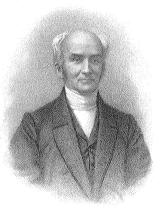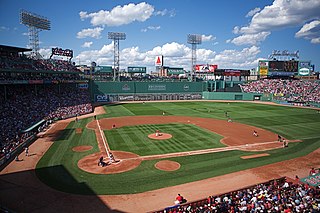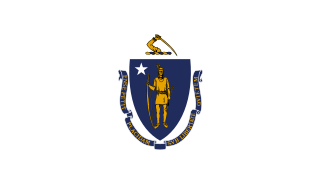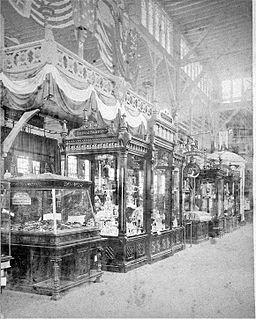
Charles Francis Adams Sr. was an American historical editor, writer, politician, and diplomat. He was a son of President John Quincy Adams and grandson of President John Adams, about whom he wrote a major biography.

Josiah Quincy IV was an American politician. He was mayor of Boston, as was his father Josiah Quincy III and grandson Josiah Quincy VI.

Timothy Gilbert was an American piano manufacturer, abolitionist and religious organizer in Boston, Massachusetts. His brother Lemuel Gilbert was also a piano manufacturer.

The Boston Museum (1841–1903), also called the Boston Museum and Gallery of Fine Arts, was a theatre, wax museum, natural history museum, zoo, and art museum in 19th-century Boston, Massachusetts. Moses Kimball established the enterprise in 1841.

The Melodeon was a concert hall and performance space in 19th-century Boston, Massachusetts, located on Washington Street, near West Street. Musical concerts, lectures, sermons, conferences, visual displays, and popular entertainments occurred there.
Samuel Hale Parker (1781–1864) was a publisher and bookseller in 19th-century Boston, Massachusetts, United States. He published musical scores as well as novels, sermons, and other titles. He operated the Boston Circulating Library, and was among the founders of the Handel and Haydn Society.
The Mercantile Library Association (1820-1952) of Boston was an organization dedicated to operating a subscription library, reading room and lecture series. Members included James T. Fields and Edwin Percy Whipple. Although the association had a relatively long history, its heyday occurred in the mid-19th century, particularly the 1840s and 1850s.

Abel Bowen (1790-1850) was an engraver, publisher, and author in early 19th-century Boston, Massachusetts.

John Plumbe Jr. was a Welsh-born American entrepreneurial photographer, gallerist, publisher, and an early advocate of an American transcontinental railroad in the mid-19th century. He established a franchise of photography studios in the 1840s in the U.S., with additional branches in Paris and Liverpool. He created a lithographic process for reproducing photographic images, called the "plumbeotype."
The Boston Brigade Band (1821-ca.1863) was a brass and reed band that performed in Boston, Massachusetts, and elsewhere in New England. Some of the musical pieces played by the band were subsequently published as sheet music, including "The Mammoth Cod Quickstep" of 1839. The band received acclaim in its day, particularly for its combination of both brass and wind instruments.

Samuel Lancaster Gerry (1813–1891) was an artist in 19th-century Boston, Massachusetts. He painted portraits and also landscapes of the White Mountains and other locales in New England. He was affiliated with the New England Art Union, and the Boston Artists' Association. In 1857 he co-founded the Boston Art Club.
The Boston Artists' Association (1841–1851) was established in Boston, Massachusetts by Washington Allston, Henry Sargent, and other painters, sculptors, and architects, in order to organize exhibitions, a school, a workspace for members, and to promote art "for the art's sake."

William Croome (1790–1860) was an American illustrator and wood engraver in the 19th century. He trained with Abel Bowen in Boston, Massachusetts. Croome's work appeared in the American Magazine of Useful and Entertaining Knowledge (1830s), Lady's Annual (1830s), Crockett Almanac (ca.1840s), and in numerous children's books.

Merrill Greene Wheelock (1822–1866) was an artist and architect in Boston, Massachusetts in the 19th century. He served in the Massachusetts infantry in the American Civil War.
The Mechanic Apprentices Library Association (1820-1892) of Boston, Massachusetts, functioned as "a club of young apprentices to mechanics and manufacturers ... whose object is moral, social, and literary improvement." Some historians describe it as "the first of the kind known to have been established in any country." Founded by William Wood in 1820, it also had an intermittent formal relationship with the larger, more established Massachusetts Charitable Mechanic Association. In its heyday, roughly 1820s-1850s, the Apprentices Library "[met] quarterly ; ... [had] nearly 200 members, and a library of about 2000 volumes; connected with which [was] a reading room, gratuitously supplied with the best newspapers and magazines of the city, and a cabinet of natural history. In addition to these advantages, the association [had] lectures and debates in the winter, and a social class for the study of elocution in the summer."
John Ashton was a merchant and music publisher in Boston, Massachusetts, in the 19th century. He owned a "music & umbrella store" at no.197 Washington Street which sold "all the new and fashionable music" ca.1819-1844. He manufactured and sold musical instruments; tuned pianos; and published and sold sheet music "of marches, waltzes, rondos, variations, quadrilles, gallopades, dances, &c. ... arranged for the band, orchestra, piano forte, guitar, flute, violin, organ &c." Among the composers represented in Ashton's stock: Comer, Joseph Haydn, Knight, Paddon, Russell, Shaw, Webb, Charles Zeuner. The firm "John Ashton & Co." was dissolved on January 1, 1844.

Tremont Row (1830s-1920s) in Boston, Massachusetts, was a short street that flourished in the 19th and early-20th centuries. It was located near the intersection of Court, Tremont, and Cambridge streets, in today's Government Center area. It existed until the 1920s, when it became known as Scollay Square. In 1859 the Barre Gazette newspaper described Tremont Row as "the great Dry Goods Street of Boston."
Louis P. Goullaud published and sold music in Boston, Massachusetts, in the 19th century. In the 1860s he worked for "Koppitz, Pruefer & Co." With Asa W. White and Edward W. White -- as the firm "White & Goullaud" -- he sold musical instruments and published sheet music. Under his own imprint he issued sheet music and Goullaud's Monthly Journal of Music. He retired ca.1886, and died in 1919.

The Odeon of Boston, Massachusetts, was a lecture and concert hall on Federal Street in the building also known as the Boston Theatre. The 1,300-seat auditorium measured "50 feet square" with "red moreen"-upholstered "seats arranged in a circular order, and above them ... spacious galleries." The Boston Academy of Music occupied the Odeon in the 1830s and 1840s Notable events at the Odeon included "the first performance in Boston of a Beethoven symphony."





















